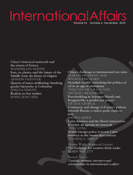International Affairs Volume 94 Series 6
Twentieth century institutions of global economic governance face a profound challenge adapting to the rise of emerging markets and, especially, China’s rise. This is especially the case for the international tax regime, whose institutional home is the OECD and which is based on norms that favour capital exporting states. To understand the nature of the challenge posed by China, we focus on the country’s engagement with a foundational norm of the international tax regime: the arm’s length principle. We show that China’s approach to tax cooperation is characterised by a set of apparent contradictions: conciliatory language hides an assault on the arm’s length principle; a rhetoric of common cause with developing countries is contradicted by actions that maximise only China’s own share of the tax ‘pie’; and a willingness to court the OECD based on the leverage gained from flirtation with outside options. In these respects, China increasingly appears to be using its market power to seek special privileges within international regimes, in ways that mirror the historical actions of the United States.
